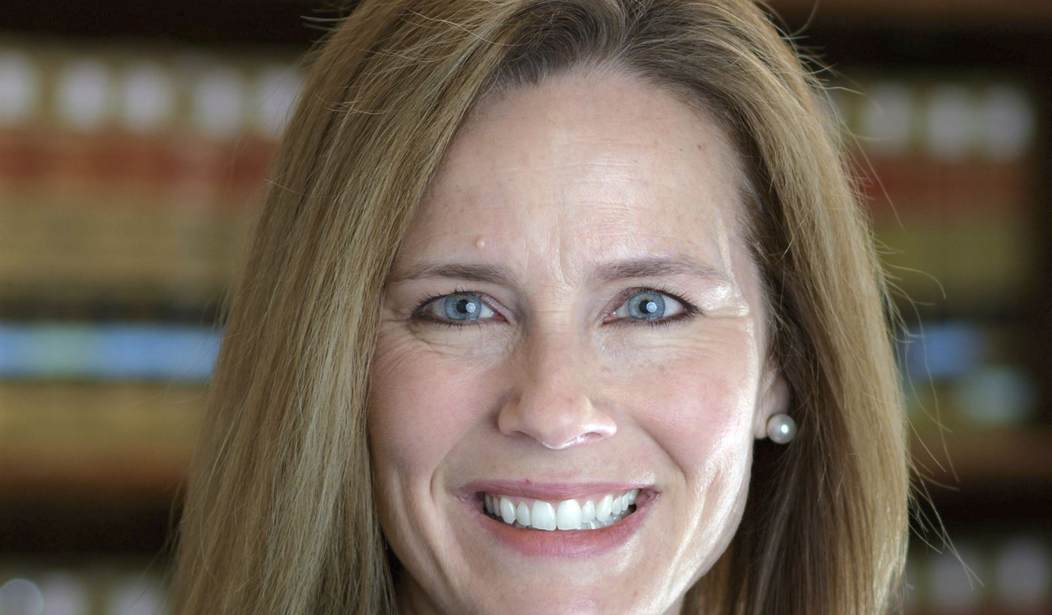Amy Coney Barrett spent a second day at the White House yesterday, almost guaranteeing that Donald Trump will choose her to replace Ruth Bader Ginsburg on the Supreme Court.
She’s not being interviewed for the job. She’s being prepped to deal with the coming onslaught of smears, half-truths, and outright lies that are designed to make her appear to be a monster in a dress.
Welcome to American democracy in the 21st century.
The media got a head start with Newsweek’s slimeball story about Barrett being a drooling religious fanatic.
Barrett is a devout Catholic, and the magazine described her (as previous profiles have) as a member of People of Praise, “the charismatic Christian parachurch organization, which was founded in South Bend, Indiana in 1971, teaches that men have authority over their wives. Members swear a lifelong oath of loyalty to one another and are expected to donate at least 5 percent of their earnings to the group.”
So she should be disqualified because of her religious affiliation? Isn’t that the essence of anti-Catholic prejudice?
Newsweek went a step further and invoked Margaret Atwood’s novel, “The Handmaid’s Tale,” “where women’s bodies are governed and treated as the property of the state under a theocratic regime.”
Well, that sounds like some fanatical group, alright — except Pope Francis, the most liberal pope in history, named one of the members of People of Praise auxiliary bishop of Portland.
Not quite the drooling fanatics they’re made out to be. In fact, they accept both Protestants and Catholics as members and believe men to be the “spiritual leaders” of the family, not that they have “authority” over the wives — not when the group encourages women to pursue advanced degrees and employment.
As far as The Handmaid’s Tale being based on People of Praise, Newsweek was forced to issue an embarrassing retraction.
“This article’s headline originally stated that People of Praise inspired ‘The Handmaid’s Tale’. The book’s author, Margaret Atwood, has never specifically mentioned the group as being the inspiration for her work. A New Yorker profile of the author from 2017 mentions a newspaper clipping as part of her research for the book of a different charismatic Catholic group, People of Hope. Newsweek regrets the error.”
“People of Hope,” “People of Praise”…what’s the difference? They’re all anti-abortion and hate their own uteruses.
From what I know of the group, it was part of a movement in the 1970s and ’80s by some Catholics who were seeing the inroads made by evangelicals and other charismatic Christian groups and wanted to bring the same fervent worship to the Church. But if we’re going to tar a religious group with what they supposedly believe being out of the mainstream or unacceptable in a secular democratic state, I guess we don’t have to worry about nominating any Muslims to the Supreme Court anytime soon.
Imagine the field day the opposition would have in grilling a Muslim candidate over any religious tenet of the Islamic faith.
Barrett is pro-life but apparently a realist about abortion.
As for those who see her as a threat to Roe v. Wade, the New York Times noted that in 2016, Barrett “said that the core holding of Roe v. Wade was that women had the right to an abortion, and that was not likely to change in the future, but how states restrict abortion might. ‘I think the question of whether people can get very late-term abortions, you know, how many restrictions can be put on clinics, I think that would change,’ she said.”
President Clinton believed that abortions should be “safe, legal, and rare.” Barrett may wish otherwise, but her judicial philosophy points to a similar outlook on the issue.
Anti-Catholic bigotry has a long history in U.S. politics. Even in 1960 during the Kennedy campaign, Democratic supporters of Hubert Humphrey tried to rile up more conservative Protestant denominations by claiming that Kennedy would have “dual allegiances” to the U.S. Constitution and the Vatican. Kennedy felt compelled to devote an entire speech at a ministerial convention in Houston late in the campaign to putting the issue to rest.
Since then, the issue has settled on the fringes of American politics. But Democrats and liberals seem determined to resurrect the issue in a political setting, guaranteeing that latent anti-Catholicism will be a force that Barrett will have to reckon with.










Join the conversation as a VIP Member